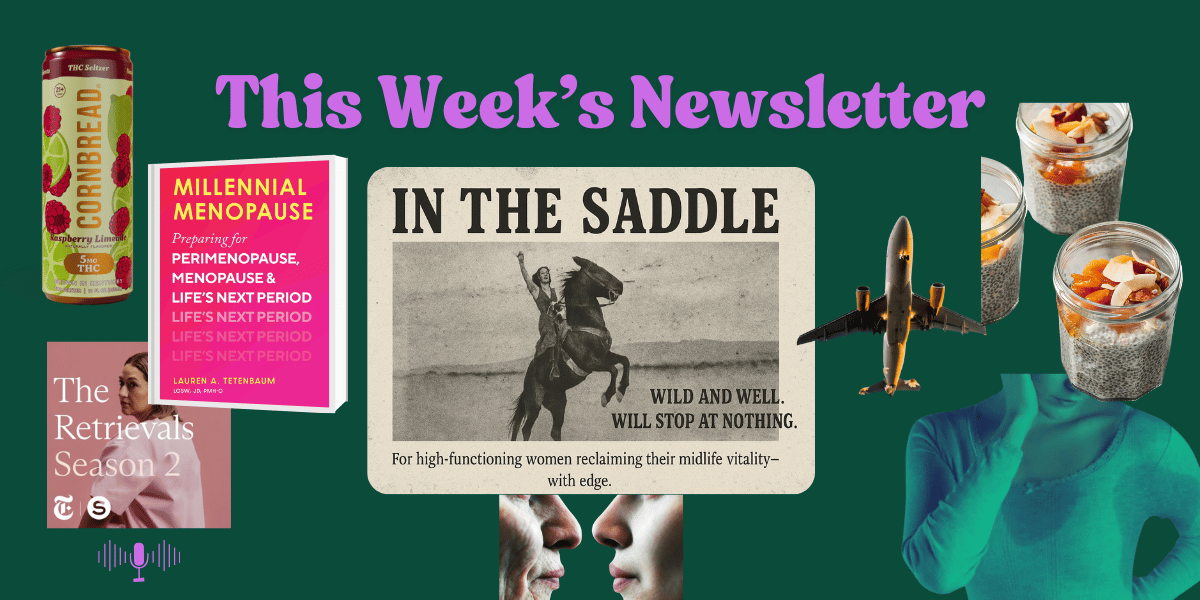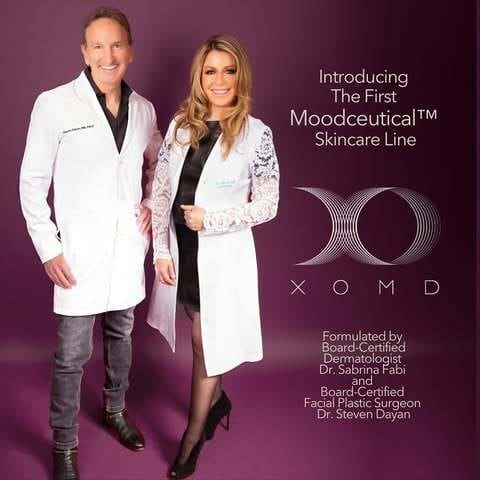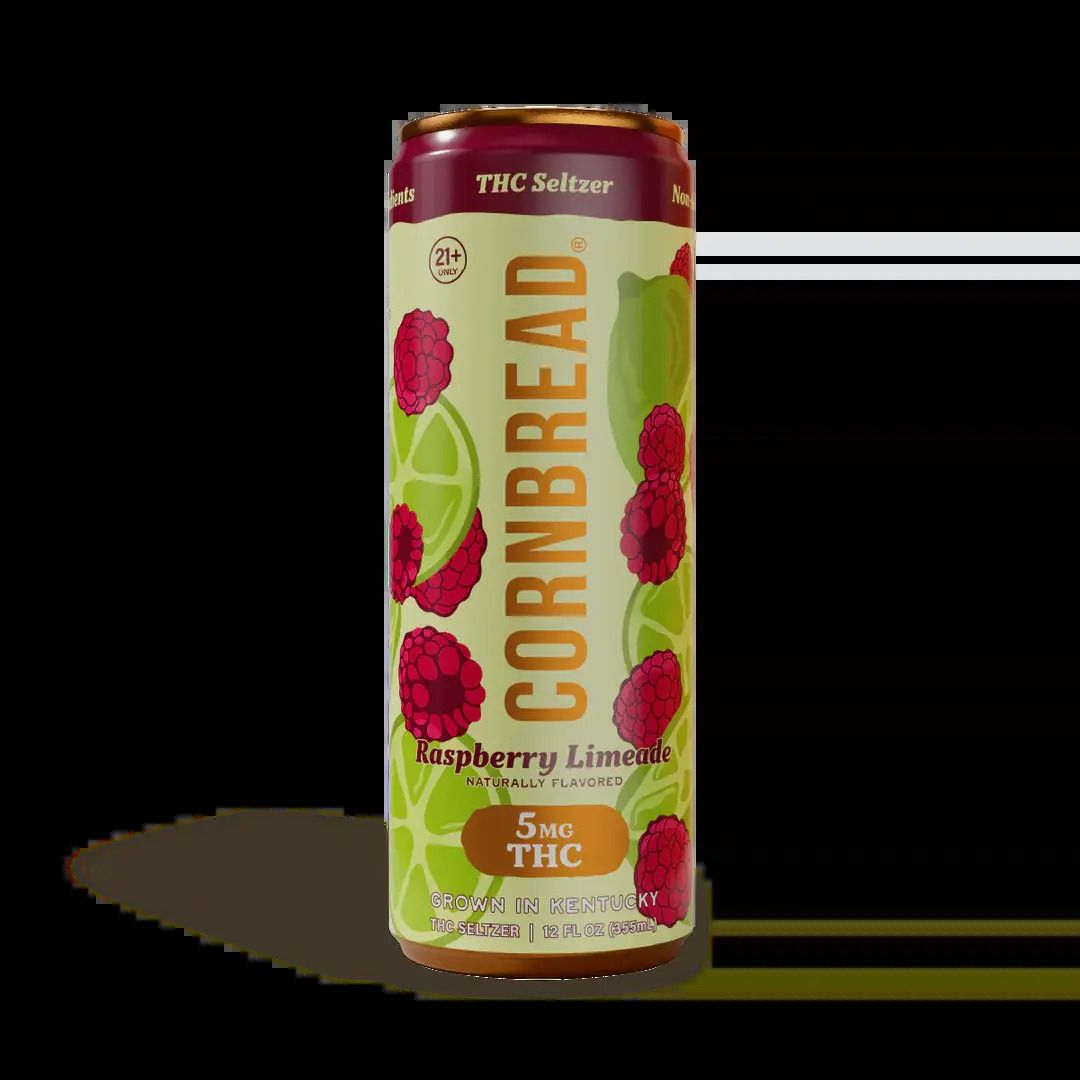
Jackie's Take: What's on My Mind in Women's Wellness ✍ 🤔 📰
Millennial Menopause: The Questions We’re Finally Asking
Lately, I’ve been sitting with a few questions I can’t stop turning over. Maybe you’ve asked them too.
Why does it seem like perimenopause is happening earlier—and more noticeably—than ever before?
Is it because women today are more body-aware, more proactive, more curious about their health? Or is something about the modern midlife landscape actually amplifying symptoms and bringing hormonal shifts to the surface sooner?
Because increasingly, women in their late 30s and early 40s are raising the flag: disrupted sleep, heavier or irregular cycles, mood shifts, brain fog, joint pain, decreased libido. Many of these symptoms fit the clinical picture of perimenopause, but women are often told they’re too young. And while the average age of menopause hasn’t changed (it still hovers around 51), there’s growing evidence that the experience of the transition is evolving.
So what’s driving it?
The short answer is: it’s multifactorial. Today’s women are entering midlife with a different physiological foundation. Compared to previous generations, they’re having children later, experiencing higher levels of chronic stress, and spending more time in sedentary, screen-dominated environments. They’re also contending with an inherited exposure to endocrine-disrupting chemicals—all of which can chip away at hormonal balance and make the transition feel more intense..
None of this means anyone is “broken.” But it does mean the perimenopausal experience is happening against a backdrop that makes symptoms harder to ignore.
This raises another question worth asking: How will this generation approach perimenopause differently than those who came before?
They already are. There’s less stigma, more education, and a stronger desire for personalized answers. Women are more likely to ask questions early, seek root causes, and explore interventions beyond the traditional scripts. They’re not waiting until their periods disappear to take symptoms seriously. And they’re far less likely to accept “you’re fine” when they don’t feel fine.
But with all that awareness comes overwhelm. More tools, more data, more options—and not enough providers who know how to help interpret them. The disconnect between what women are experiencing and what medicine is prepared to validate is real. No wonder so many are turning to self-guided care, direct-to-consumer platforms, and alternative protocols when conventional systems fall short. (Also, no one has time for a four-month waitlist and a portal message that says “drink more water.”)
And then there’s the question I hear so often in practice: How do you know if what you’re feeling is postpartum… or perimenopause?
For many millennial women, those two life stages are no longer separate. Babies are being born later, and cycles are becoming irregular sooner. One moment you’re navigating postpartum recovery, and the next, you’re wondering if that anxiety, low libido, and disrupted sleep is something more long-term.
The symptoms overlap, and yet the care remains fragmented. A patient might see her OB/GYN and hear, “This is just postpartum—give it time.” She might also see her PCP and leave with an SSRI. Rarely is anyone mapping the full hormonal landscape—asking whether postpartum recovery and perimenopause might be coexisting, compounding, or even masquerading as one another. And without that fuller picture, treatment is often piecemeal at best.
All of this is what makes my dear friend Lauren Tetenbaum’s new book, Millennial Menopause, such a welcome addition to this conversation.
It’s not a panic button. It’s a clarifier.
Lauren is a licensed clinical social worker, a reproductive mental health expert, and a millennial herself. She’s spent years supporting women through fertility, motherhood, loss, career transitions, and identity shifts—and brings that depth and nuance to the menopause conversation with rare clarity. Her book is a smart, grounded guide to a life stage that’s long been overlooked and under-discussed—especially for women who don’t see themselves in the traditional menopause narrative.
Lauren unpacks not only the symptoms but the stories women carry: about timing, identity, health, and permission. She’s not here to tell anyone exactly what to do. But she is here to name what so many feel but haven’t had language for. And she does it with warmth, insight, and zero condescension.
If you’re in your 30s or 40s and wondering whether what you’re feeling is real, relevant, and worth addressing—this book is a resounding yes.
Get it. Highlight it. Pass it on. And keep asking questions. Because perimenopause isn’t a problem to be feared—it’s a phase to be understood.

June 2025, NYC
💬 Let’s Keep the Conversation Going
As the summer goes on, you will see me continue to ask questions about how to better serve this community—what you’re navigating, what still feels unclear, and how I can help you feel more supported and informed through it all. I am in full on In the Saddle build mode over here, sooooooo 👇👇👇
Quick favor before you scroll—tap the answer in the poll below below that fits you best 🙏
How many doctors or other providers have you seen for Perimenopause symptoms before getting real answers?
The Tea: What's Trending in Women's Wellness & Culture 🍵 🛍
👑🧬 Step Aside, Longevity Bros—It’s Time for the Longevity Ladies
Finally, a longevity article that doesn’t bore us with creatine and cold plunge. This one dives into the rise of women reclaiming the space—building protocols that actually reflect female physiology, hormone shifts, and real-life demands.
I’ve been saying this for years: we don’t need to “pinkwash” bro-science—we need to rebuild the model. This piece is a smart, timely reminder that women’s longevity isn’t just a watered down version of men’s—it’s a fundamentally different playbook.🩺 (WSJ)
🧠🔬 Research Corner: Cortisol May Fuel Cancer Risk in BRCA Carriers
I’ve long suspected that stress plays a bigger role in cancer risk than we give it credit for—and this new study in Nature makes that link hard to ignore. Researchers found that cortisol (your main stress hormone) can actually cause DNA damage in breast tissue and delay repair in BRCA1/2 mutation carriers. In both women and men with BRCA mutations, higher cortisol levels were linked to a significantly increased risk of breast and prostate cancer.
This isn’t just a mental health conversation—it’s a cellular one. If you’ve ever brushed off stress because “everyone’s stressed,” this is your reminder: it matters. A lot. 🧬💥
🫘📈 Fibermaxxing Is the New TikTok Trend—But the Science Is Solid
Normally I roll my eyes at TikTok wellness trends, but this one actually has legs. Fibermaxxing (aka loading up on high-fiber foods like beans and psyllium husk) is going viral, and has the science to back it up.
If you’ve been looking for a low-lift, high-impact upgrade for your gut, hormones, and blood sugar—this might be it. Fiber is just one of those supplements that you really can’t go too hard at 👑🦠 (NYT)
😅💦 Why Do I Sweat So Much?
If you’re suddenly sweating through your sheets, shirts, or summer social life, this one’s for you. From hormones to heat sensitivity to nervous system activation, this article explains why women—especially in midlife—can feel like human humidifiers.
Yes, it could be perimenopause. No, it’s not just “in your head.” And yes, it’s worth talking about without shame or silence. 💧🙃 (Time)
✈️🩺 Inside the High-End World of Medical Tourism and “Executive Checkups”
This piece walks us through the velvet-rope world of concierge medical care—think elite checkups in Austrian spas with MRI suites and lymphatic drainage on tap. It’s both fascinating and…kind of infuriating.
Yes, everyone deserves high-quality, preventive care. But what happens when that care is only accessible if you can afford to fly across the world for a stress test? It’s a compelling look at where wellness and wealth intersect—and reminds us what we still need to fix. 🧳💉(Goop)
This Week on The Well Kept Podcast🎙
Unlocking the Secrets of Skincare & Aging with XOMD’s Dr. Sabrina Fabi 🔓
This week we sit down with Dr. Sabrina Fabi, double board-certified dermatologist and co-founder of XOMD Skincare, to discuss:
The inspiration behind XOMD—a line designed to mimic the skin-enhancing effects of oxytocin (the “connection hormone”).
How oxytocin-based skincare may support both skin health and emotional well-being.
The “pregnancy glow” effect and the science behind it.
Insights from Dr. Fabi’s clinical trials and experience in aesthetic medicine.
Why confidence, connection, and holistic wellness matter in the aging process.
🎧 Bonus: In the Saddle subscribers can enjoy 20% off XOMD Skincare with code GLOW. 🎧
Listen here on Spotify →🎙
The Group Chat Edit 📲 👯♂
📘 To Listen: The Retrievals (Season 2)
Did you know that C-sections are the most common major surgeries worldwide? Yet, many women experience intense pain during the procedure. Season 2 of the acclaimed podcast “The Retrievals” dives into this often overlooked issue and explores the latest efforts to address it.
🛍 To Buy: These Summer Seltzers 🍓
These come with 5mg of pure hemp-derived THC, all-natural flavors (salted watermelon, yum!), and only 30 calories and 5 grams of sugar. Use code FEELGOOD30 for 30% off your first order. Cheers! 🍉
🌫 To Try: BTL Exomind 🧠
This neuromodulation device uses radiofrequency and ultrasound to target the prefrontal cortex, boosting blood flow and supporting cognitive function. Anecdotally, I have heard from some patients that it has made a difference in their brain fog and ability to focus. 🤷♀
While definitely NOT FDA approved for this indication, it’s gaining traction—especially now that GP is lending her glow to the cause.
Saddle Up & Spread the Word 🏇💨

If you’re still reading, thank you. In the early days of a business, every subscribe, like, and share makes a real difference. Your early support means so much as I keep building In the Saddle - both the newsletter and this community ⭕
To share — Just click and copy this link: https://inthesaddle.beehiiv.com/
If you’re a brand, expert, or just someone with an excellent story to tell in the wellness, longevity, or sexual health space, I’d love to connect! I am always open to hearing ideas for ITS content and collabs. ✏️ 🏇🔥
With gratitude always,
Jackie Giannelli, FNP-BC, MSCP
Founder, In the Saddle
What did you think of today's newsletter?
Medical Disclaimer:
The content provided in this newsletter is for informational and educational purposes only and is not intended as a substitute for professional medical advice, diagnosis, or treatment. Nothing contained herein should be construed as medical guidance or the practice of medicine. You should always seek the advice of your physician or other qualified healthcare provider with any questions you may have regarding a medical condition or treatment. Never disregard professional medical advice or delay seeking care because of something you read in this newsletter. Use of the information provided is at your own risk. No clinician-patient relationship is formed through this content.







